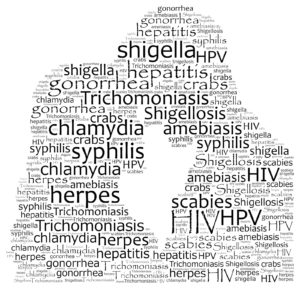01 Jun STDs: Why Does the Dentist Need to Know?
 We would like to talk to you about something that is quite taboo, but very necessary. We are all adults here, so no giggling! If you follow our Facebook, page, we posted a couple of pieces on sexually transmitted infections, or STIs as the kids say today. Why does your dentist want to discuss this? Well, it is because it finally needs doing. Some of it is because they have to go poking around in your mouth and they deserve a heads’ up if you have something. The other reason is that extra precautions need to be taken if you have one to make sure your STI is not transmitted to your dentist, the hygienist, or other staff that may have to come into contact with the infected areas.
We would like to talk to you about something that is quite taboo, but very necessary. We are all adults here, so no giggling! If you follow our Facebook, page, we posted a couple of pieces on sexually transmitted infections, or STIs as the kids say today. Why does your dentist want to discuss this? Well, it is because it finally needs doing. Some of it is because they have to go poking around in your mouth and they deserve a heads’ up if you have something. The other reason is that extra precautions need to be taken if you have one to make sure your STI is not transmitted to your dentist, the hygienist, or other staff that may have to come into contact with the infected areas.
So, we are sure you know how STIs are spread, but we are going to focus on a big mode of transmission that are a big concern for dentists – the mouth. Some STIs do not present symptoms until something triggers it, like stress, illness, etc. Sometimes, sores develop which may be painless of not. Lesions, like cold sores and fever blisters, as well as a sore throat with painful swallowing and discharge can also be present. Many STIs can be passed through the act of oral sex, like mononucleosis, gonorrhea, syphilis, chlamydia, and herpes. Sometimes, your partner may be asymptomatic (not showing symptoms, like open sores or pus), but they can still pass on disease.
Your dentist can help you with these concerns if you are honest with him or her. They can help diagnose and prescribe treatment for the affected area while also helping you prevent further transmission of the disease. One of the best things you can use is a dental dam. It’s the thing the dentist uses when they wish to isolate a tooth. In oral sex, it helps prevent contact between the mouth and genitals. They can be purchased online, in certain specialty stores, or at your local pharmacy.
Remember to always practice safe sex no matter what form it may take and always get tested regularly if you are not in a monogamous relationship. Be open about talking to your dental and healthcare providers about any issues or concerns you may have. One of the surest ways to stop a disease from infecting another person is to stop it in its tracks by not letting it infect them in the first place. Be a responsible partner and always practice excellent hygiene – from your mouth and down south.


